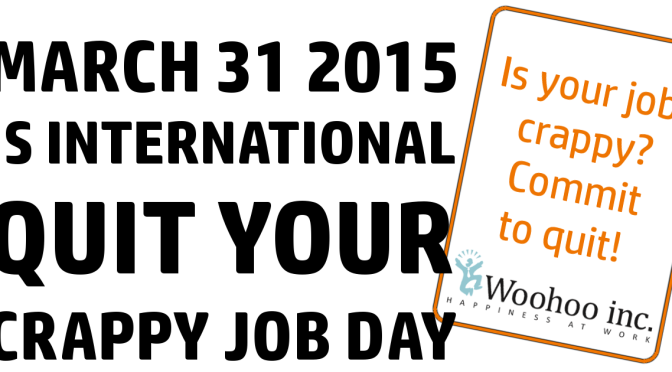If I write a short e-book about quitting your job, what should I call it?
Here are the best ideas from when I asked the same question on Facebook:
(more…)
If I write a short e-book about quitting your job, what should I call it?
Here are the best ideas from when I asked the same question on Facebook:
(more…)

I’ve been pretty unhappy in my job for quite a while now. The workplace is fairly stressed, I feel completely unappreciated and I can’t really see the purpose of most of the work I do.
I want to get out of there but whenever I discuss the idea of quitting with my friends and family, I get the same reactions: “Are you sure that’s the right thing to do? Surely your job can’t be that bad. Maybe things will get better.”
My parents were worried how I would provide for my family and basically called me selfish for not just sticking with it. One friend even warned me “quitting will look bad on your CV.”
Quitting a job you don’t like is a tough call and it’s made tougher by some very persistent myths. These myths create a social stigma around quitting – which is silly because quitting is perfectly natural. In fact, 10-15% of us do it every year.
These myths keep us stuck in bad jobs and give bad leaders and toxic workplaces much more power over us than they would otherwise have. Let’s change that. Here are the Top 5 Myths About Quitting.
Do any of these sound familiar? According to traditional thinking, once you’ve started something you should never quit and if you do it’s a clear sign of failure.
I say that’s completely wrong and sometimes quitting is exactly the right thing to do. I’m reminded of the story of Danish opera soprano Tina Kiberg.
As a child, Tina was a pretty good violinist and spent her free time practicing and practicing. One day she participated in a violin contest and realized that she would never be more than a mediocre violinist and that she also enjoyed singing more. She quit the violin, took up singing and became a leading international opera singer.
If she had seen quitting as always the wrong thing to do, she might have been stuck with the violin.
Also, try to guess what these somewhat successful people have in common: Larry Page, Sergey Brin, Tiger Woods, Reese Witherspoon, John McEnroe and John Steinbeck?
Yep, they all dropped out of Stanford.
Truth #5: Sometimes quitting is the way to success in something else and staying = failure.
You quit your job? Well, I guess you don’t have what it takes to succeed. Too bad you couldn’t hack it and chose the easy way out.
Some people see quitting as a sign of weakness. I say that’s nonsense. In fact, the easy thing to do is to just keep mindlessly going into that job you hate day after day, year after year. It may be horrible, but you know what you have and you avoid the uncertainty of making big life-changing decisions.
Quitting on the other hand takes guts. In fact, quitting a workplace that is toxic or getting away from a boss who’s a complete jerk can be a downright heroic act.
Truth #4: Quitting can be a courageous (or even heroic) act.
How can you be so selfish and quit your job? You’re letting down the workplace, your customers and your coworkers. Also, think of your family – how are they going to manage if you quit?
Wrong.
If you don’t like your job, you’re doing no one a favor by staying. When you’re unhappy at work, it tends to affect everyone around you through a phenomenon called emotional contagion and there’s a good chance you’re making your coworkers and possibly even customers less happy.
As for your family, maybe they would be happier if you didn’t come home from work every day tired and frustrated. You might even set an example for your kids. A member of the audience asked me this at one of my speeches last year:
If you go into work day after day, year after year, and really hate your job and come home stressed and angry – what are you teaching your kids?
Truth #3: Quitting is not inherently selfish.
If you quit your job it’s going to look bad on your CV and your career will take a hit.
Yes – and staying for years in a job you hate and that is slowly wearing you down is going to be AWESOME for your career.
This myth completely ignores the career risks of staying in a job you hate. In fact, the longer you stay, the more you lose the energy, motivation and self-confidence you need to advance your career.
Truth #2: Sometimes quitting is the best thing you can do for your career.
Sure you can consider quitting, but you should exhaust all other options first. You only quit when everything else has failed.
For people who believe this myth, quitting is the very last option. It’s what you do once you’re too broken and exhausted to possibly stay on at your current job.
That makes this potentially the most dangerous of the myths listed here, because it means people stay in bad jobs until (or past) their breaking points.
Truth #1: Quit when it’s the right thing to do – not when it’s the only option left.
Whenever a friend tells me they’ve quit their job my instant reaction is always “Awesome! You made a tough career decision. You took initiative and decided to move away from a bad job or into something even better.”
I say we start celebrating those who quit their jobs for the brave, motivated and proactive individuals they are.
Did I miss any myths about quitting? Have you encountered any of these in your work life? How do you react when someone close to you talks about possibly quitting their jobs?
My speech from this year’s Meaning Conference in Brighton just went live. It’s 11 minutes long and you can watch it right here:
I personally feel this speech was pretty rough – it is the very first time I’ve spoken about this particular topic and it shows. But I’m very passionate about inspiring more people to say “NO” at work and will be refining this message further.
The web site I mention in the speech is live and you can go on there now and get a ton of tips on quitting your job.

Too many people stay for too long in jobs they hate. An estimated 20-25% of employees hate their jobs and wish they could quit tomorrow.
This is bad for you. Being unhappy at work can destroy your career, your health, your family and your private life.
Quitting is an option and often it’s the best option. That’s why we’re declaring March 31 to be International Quit Your Crappy Job Day.
We’ve created a web site for it, where you can test yourself to see if it’s time to quit and get knowledge and inspiration to actually do it.
Visit InternationalQuitYourCrappyJobDay.com.
Know someone who’s miserable at work? Share the site with them and maybe that can inspire them to move on to something better.

How do you know if you’re unhappy at work? That something is not right and that it’s time to either make some changes at work or move on to a new job?
Helping people obtain Happiness at Work is my Job. I’ve talked to a lot of people who hate their jobs and I’ve noticed some common warning signs.
If you’re wondering if it’s time to quit, take the test to see how many of these warning signs you exhibit.

I got an awesome email from a reader of the blog, who found the courage to quit a well-paying job and move on to something else. Here’s his story:
I was very unhappy in my last job, and though I knew your work, I still quit too late. I feel like I should have quit half a year ago.
So, why did I stay too long in the old job?
There were two reasons: One was money. Not the amount they pay, but rather the security that it gave me. I had no savings but was in debt. Which scared me about changing my job. If the new job wouldn’t have been good, I would have had a problem. This is now different, when I finally applied I had enough savings to live for some months without a job.
The second reason was the memory of the good times in this company. It really started out nice. Most people there are really likeable. The problems started when a coworker quit and I got his position. This position is really shitty, because of bad management and a lot of organizational problems. Of course, I knew part of this beforehand and I made it a condition that these things change. My boss agreed to this, because otherwise I would have refused to take the position. But in nearly a year, next to nothing changed. Of course, a lot of things changed. But not the really important stuff. For a long time I thought they will change, I worked for them to change. I just wished to be as happy as in the beginning.
Over time, I developed most of your warning signs. (Physical symptoms, procrastination, I stopped to care, …) The unhappiness made me even more unhappy.
When I’m happy, I’m motivated and do my work well. When I started to grow unhappy, I saw that my work isn’t as half as good as it could be. And I even need more time to do it, because I didn’t want to do it in the first place. Knowing I do not nearly as good as I could increased the unhappiness and decreased motivation further. So it grew worse over time, with no way out. I even tried to get rid of this work, to get new assignments. But nobody else at the company had the necessary knowledge, so my boss wouldn’t let me change it, despite knowing that I am not happy with it.
At my new workplace, the manager talks about motivation and job satisfaction/happiness. (The German word used is Zufriedenheit, which can be translated both ways).
There is also a culture of respect. The managemant demands that people work together for a common goal, which is also very nice. All the people I know so far are nice and welcoming. I only work for two days at my new job, but I’m already confident that this will be a nice place to work.
I wrote this down, in case you want to use it for any future article. If you use it, please substitute my name with a pseudonym.
Kudos on finding the courage to quit an unhappy job and move on to something better!

I’ve done it myself once. I was working really hard as a developer, when one seriously under-qualified manager called me unprofessional in a meeting. I stood up, left the meeting and resigned the next day.
Everything worked out fine for me – I went out on my own and became an independent consultant and went on from there to co-found an IT consulting company where we treated people right – and now I make people happy at work :o)
What about you?
I have a suspicion that if you’re reading this, you’re thinking of quitting.
In that case, remember that March 31st is International Quit Your Crappy Job Day. Check out the site – it is packed with information for anyone considering whether or not to quit their job.